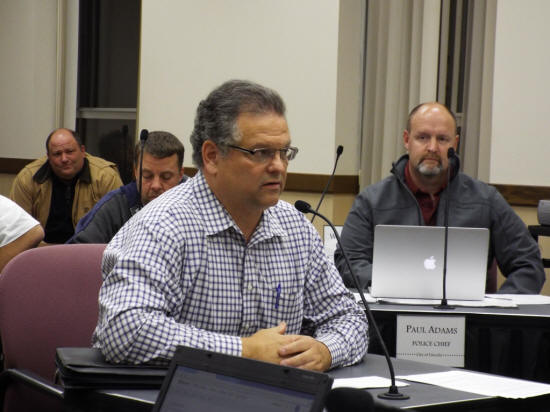|
Lincoln Aldermen hear from Jack
Rooney regarding status of Lincoln Theater and other properties
owned by MMIL Properties
 Send a link to a friend
Send a link to a friend
 [November 21, 2018] [November 21, 2018]
At the Monday night meeting of the Lincoln City Council the evening
began with Jack Rooney addressing the council during the public
participation segment. Rooney is the investor/owner of MMIL
Entertainment and MMIL Properties, the entity that owns the Lincoln
Grand 8 Theater, as well as several other properties in the downtown
Lincoln area.
In recent weeks, news has come out that the Lincoln Grand 8 is in
financial trouble, and that foreclosure is imminent. The theater has
been under the management of Lincoln resident David Lanterman, who
was also an owner/investor within the parent corporation.

Having the theater go into foreclosure and possibly sell to a new
owner or be abandoned is of great concern for the city due to the
Tax Increment Financing that was provided for the construction of
the theater. The TIF allowed for the theater to receive a $2 million
“loan” that would be paid back through the increase in property
taxes derived from the improvement of the property.
Rooney reported Monday night that Lanterman is “stepping back” from
the theater and that he (Rooney) is “stepping up” to try and save
the theater from foreclosure.
Rooney began by saying he had no background in theater or real
estate, but was an IT consulting business in Springfield. He said
however he did have some experience in “decent sized” business.
He said in the last few weeks, he had come to Lincoln to get a
snapshot of the business. He said that coming into it he was pretty
nervous and was supposing that the picture would be so grim that
there was just no way to save the theater. However, he said that
right away there were four to five good ideas that presented
themselves, and he felt that working to implement those ideas could
save the theater and make it profitable.
Rooney said he was not coming to the city for any kind of
assistance. He wanted to just let them know he is ready to go full
speed ahead, get the taxes paid off, get the TIF taken care of and
make some money.
He said that on the bad news side, he had expected to find that the
properties belonging to MMIL would be in better shape financially
than they are. He said again there are back taxes owed, and that on
the property side of the story there is a need for a “cash
injection.”
He said that MMIL is renegotiating with the bank regarding the
theater, but with the properties there are several banks involved,
so that is going to make it a bigger challenge.

Rooney asked if the aldermen had any questions. Ron Keller asked him
to address his vision for the future of the theater. Rooney said
that he does have a vision and that it includes faith in God. He
said that he has always been a Christian, but in the last few years
has become a stronger Christian. He said that it was God who brought
Marilyn Altman to him at the perfect time.
Rooney said he had also spent time going around the town and talking
to people in the community about Lincoln. He said he didn’t want to
be derogatory, but he had seen that the community is in need of
help. From there he said he had changed his focus from showing
movies and making money to doing something to strengthen the
community.
He explained his vision brochure that he would later hand out.
He also said he had a vision for the properties. He said that many
of those properties are in what he calls the “Depot corridor.” He
was referring to properties owned along Chicago and Sangamon
Streets. He said that he can envision this area as a place to create
a tourist visitor destination point where there were
historical/tourism oriented and retail oriented storefronts that
would capitalize on the area and make it a destination location in
Lincoln.
Rooney also noted that his vision for the corridor was not short
term or quick turnaround, it was a plan that would or could be
implemented over a five-year-period.
Ron Fleshman asked how many properties Rooney was talking about.
Altman spoke up and provided the number, which is 36.
Tracy Welch asked how many of the properties had, had their taxes
sold. Rooney said he would venture that all of them have.
[to top of second column] |


Welch then asked if Rooney’s plan included paying the taxes and also renovating
the buildings. Welch noted that many of the buildings in question are in pretty
bad shape.
Rooney said it would be a big challenge. He noted that he was feeling pretty
good about the theater, but that the cash injection would be a ‘pretty tall
order” on the properties side. He said he had done some traveling and had been
looking for anyone with an interest in tourism who might be willing to invest.
Right now though, he said he didn’t know where that money was going to come
from.
He added that the properties had also funded the theater. He said that the
properties themselves would have been okay, but money from the properties had
been given to the running of the theater.
Welch said that since news broke that the theater was in foreclosure it had been
the talk around town and some were speculating as to what would happen next.
Among the questions Welch has heard is, will Rooney attempt to turn the theater
into a 501C3 not-for-profit business?
Rooney said that he had spoken with his accountant/friend who had made that
suggestion. Rooney said, “I was fine with it, it sounded good to me.”
Welch told Rooney that a 501C3 was tax exempt and that tax exempt property would
not pay toward the TIF. Rooney then responded, “So I guess in that case, that
idea is not going to happen.”

Rooney said that he was just kicking around some different angles. He then added
that right now the theater is decent, his bigger issues are with the properties.
He said that he and Altman are implementing some cost saving ideas already. He
also mentioned that one thing that would help would be volunteer labor. He noted
that theaters in Chillicothe and Rushville used volunteer labor.
Rooney went on to say that the theater structure and size was not the best fit
for Lincoln. He noted that the theater would be better suited for a larger
community such as Bloomington or Peoria.
City Treasurer Chuck Conzo sought clarification on comment Rooney had made
earlier about the properties supporting the theater. Rooney had presented that
comment in such a manner that Conzo felt he was saying that the Theater TIF had
impacted the taxes on the properties, making it harder for MMIL to pay those
taxes. Rooney said no, that was not what he intended to say.
He explained that cash had been physically transferred from the properties
accounts into the theater account to pay theater costs.
When Rooney had finished, Wanda Lee Rohlfs came forward with some questions
about the TIF. She inquired about the balance on hand in the TIF fund to pay the
upcoming bond payment for 2018. Conzo said there was money available to pay this
year’s payment, but that the excess cash that had been in the bank prior to this
year would be depleted, bringing the account down to close to zero.
Rohlfs then asked what would happen if in coming years the money is not
available to make the bond payment from the TIF account. Conzo said that it
would have to come from the general fund, and that the telecommunications tax,
which is also shrinking each year due to fewer land line telephones, would be
the first money to go, then it would just be taken directly from the general
fund balance.

Rohlfs also talked about the exemptions from the TIF. She noted that according
to TIF rules, when a property sells, the new buyer has the option to opt out of
the TIF district.
Rohlfs concluded on that topic saying she was very glad that the 501C3 had come
up during the discussion with Rooney. She said if that were to happen it would
have a large impact on the city’s ability to pay off the TIF bond.
At the Monday night meeting there was no request for action by the city from
either Rooney and the council moved on into the regular voting session agenda.
[Nila Smith] |